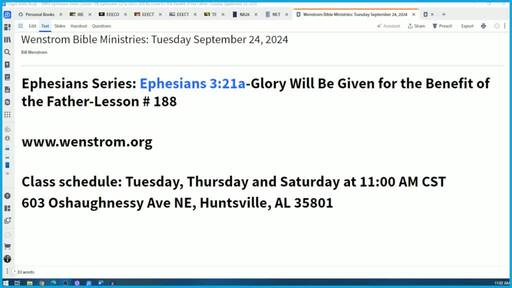Ephesians 3.21a-Glory Will Be Given for the Benefit of the Father
Wenstrom Bible Ministries
Pastor-Teacher Bill Wenstrom
Tuesday September 24, 2024
Ephesians Series: Ephesians 3:21a-Glory Will Be Given for the Benefit of the Father
Lesson # 188
Ephesians 3:20 Now, on behalf of the one who for His own glory possesses the ability to accomplish infinitely beyond anything that we at any time could urgently request for the benefit of ourselves or at any time could imagine. This corresponds to His power, which for His own glory is working within each one of us. 21 For the benefit of Himself alone, glory will be given because of the church specifically because of the church’s faith at justification and union and identification with the Christ, who is Jesus throughout all the generations without exception, that is, throughout eternity, during these ages. Amen. (Lecturer’s translation)
Ephesians 3:20-21 constitutes the closing of Paul’s second intercessory in this epistle on behalf of the recipients of this epistle who were Gentile church age believers living in the various cities and towns in the Roman province of Asia.
These verses contain a doxology, which is on behalf of God the Father.
This doxology is also composed of three parts:
(1) In verse 20, a description of the Father as the one who is addressed.
(2) In verse 21a, a declaration of praise of the Father.
(3) In verse 21b, the period of time in which the Father will be praised by the church and all the redeemed of history.
Ephesians 3:21 is composed of the following:
(1) elliptical declarative statement: autō hē doxa (αὐτῷ ἡ δόξα), “For the benefit of Himself alone, glory will be given” (Author’s translation)
(2) prepositional phrase: en tē ekklēsia (ἐν τῇ ἐκκλησίᾳ), “because of the church” (Author’s translation)
(3) prepositional phrase: en Christō Iēsou (ἐν Χριστῷ Ἰησοῦ), “because of the church’s faith at justification and union and identification with the Christ, who is Jesus” (Author’s translation)
(4) prepositional phrase: eis pasas tas geneas tou aiōnos tōn aiōnōn (εἰς πάσας τὰς γενεὰς τοῦ αἰῶνος τῶν αἰώνων), “throughout all the generations without exception, that is, throughout eternity, during these ages” (Author’s translation)
(5) interjection amēn (ἀμήν), “Amen.”
The elliptical declarative statement contains the dative third person masculine singular form of the intensive personal pronoun autos (αὐτός), “for the benefit of Himself alone,” which is fronted and thus in the emphatic position.
The referent of this word is God the Father.
This is indicated by two factors.
The first is that it is resumptive of the articular dative masculine singular present middle participle conjugation of the verb dunamai (δύναμαι), “on behalf of the one who for His own glory possesses the ability” whose referent is the Father because He is the word’s nearest referent (verse 19).
Secondly, Jesus Christ is mentioned immediately after autos (αὐτός) here in verse 21.
This intensive personal pronoun autos (αὐτός) functions as a dative of advantage or benefactive dative, which indicates that the Father is “the beneficiary” of the glory, i.e., praise throughout all generations, that is, eternity or in other words, during the ages.
Also, in this elliptical declarative statement is the articular nominative feminine singular form of the noun doxa (δόξα), which refers to the adoring praise, honor, recognition and worshipful thanksgiving that will be directed towards God the Father.
This word contains the figure of metonymy, which means that glory is put for giving glory or praise to the Father.
This interpretation is indicated by the fact that in eternity future the church will give God the Father glory as expressed through adoring praise, honor, recognition and worshipful thanksgiving because of their so great salvation.
This was accomplished through His Son’s crucifixion, death, burial, resurrection and session at His right hand.
They will also give the Father this glory because they appropriated this salvation at the moment of justification when they exercised faith in His Son.
They will also give Him glory because they were placed in union with His Son and identified with Him in His crucifixion, death, burial, resurrection and session at His right hand through the baptism of the Spirit at justification.
The Father will receive this glory because He is the creator of the new humanity which He created through the personal agency of His Son Jesus Christ and specifically through His crucifixion, death, burial, resurrection and session at the right hand of the Father.
The Holy Spirit places Jewish and Gentile church age believer in union with Jesus Christ at justification and identifies them with Jesus Christ in His crucifixion, death, burial, resurrection and session at the Father’s right hand.
This new humanity under the headship of His Son will dispossess Satan and his fellow evil spirits as the ruler of this word at His Son’s Second Advent.
Together, they will reign with His Son Jesus Christ over the earth for a thousand years.
This declarative statement in Ephesians 3:21 is elliptical because Paul deliberately omits the third person singular future active indicative conjugation of the verb eimi (εἰμί), though it is implied.
This word means, “to take place, occur” and is used of an event taking place in the future.
This indicates that the glory or praise to be given to the Father as expressed through adoring praise, honor, recognition and worshipful thanksgiving “will in the future take place.”
Therefore, this indicates that the glory in the form of adoring praise, honor, recognition and worshipful thanksgiving “will in the future” be given for the benefit of the Father.
The future tense of this verb eimi (εἰμί) is a predictive future and is thus eschatological in nature indicating that glory in the form of adoring praise, honor, recognition and worshipful thanksgiving that will be given for the benefit of the Father “will take place in the future.”

